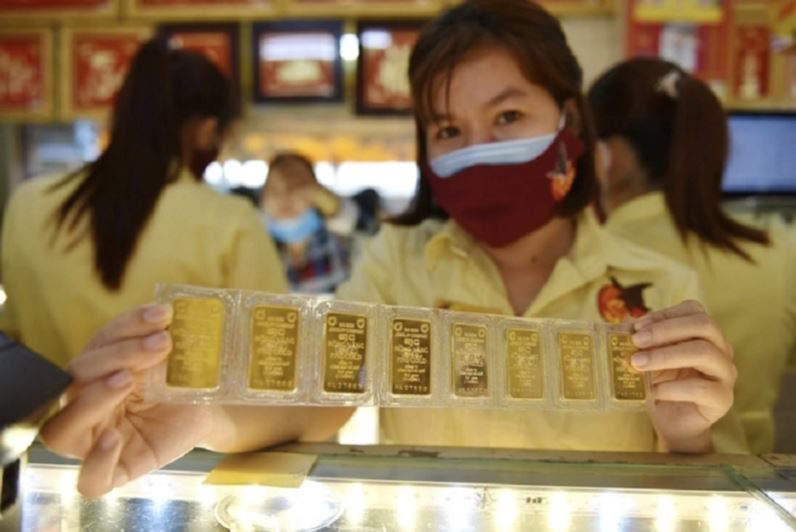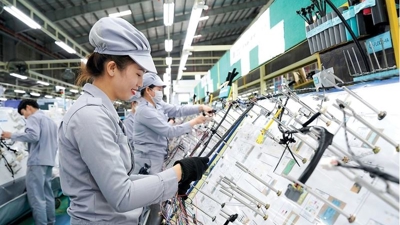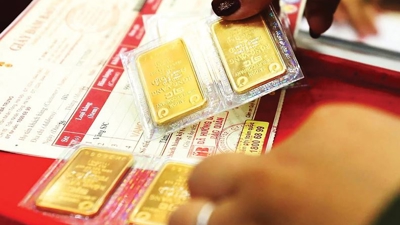To ensure a stable gold market
Associate Professor Nguyen Huu Huan from the University of Economics Ho Chi Minh City tells Vietnam Economic Times / VnEconomy’s Hoang Lan of the need for appropriate government intervention to ensure the gold market operates stably.

Some have suggested increasing gold imports to narrow the price gap between domestic and global prices, but this could impact foreign exchange reserves and the exchange rate. What are your thoughts?
In my opinion, the State Bank of Vietnam (SBV) should calculate gold import quotas for licensed businesses based on trade or balance of payments surpluses at specific times. When the economy has a high surplus, more gold can be imported, and vice-versa. This approach would help control the exchange rate and minimize any negative impacts on foreign exchange reserves and monetary policy.
Some have proposed allowing State-owned commercial banks to import gold, but I believe this is not appropriate since banks are not directly involved in gold production or trading. If banks import gold and sell it to gold businesses, it would create an unnecessary intermediary, widening the price gap between the domestic and international markets.
Therefore, import licenses should go directly to qualified gold businesses based on their financial capacity, production capability, business scale, and reputation, to ensure the quality of gold available to the public.
We must avoid the “marketization” of the gold business, as happened before Decree No. 24, dated April 3, 2012, on gold business activities was introduced, which led to poor quality control and the spread of counterfeit and substandard gold.
Gold market policies should be adjusted depending on whether the government encourages or discourages gold ownership. Tax policies on gold should also be carefully considered. High taxes could lead to smuggling and widen the price gap between the domestic and international markets.
How do you propose mobilizing gold resources from local people for economic development?
We need to develop a gold credit market to encourage people to stop hoarding gold. This would allow us to unlock significant capital currently sitting in individuals’ safes. Specifically, the SBV should encourage people to deposit gold and receive interest, similar to savings deposits. They would receive a certificate of ownership guaranteed by the SBV. These gold credits would earn interest (lower than regular savings rates) but would be backed by gold.
People could freely trade these gold credits without the legal concerns of physical gold transactions. They could also withdraw gold from the SBV like they would money from a savings account. This approach would help the government mobilize significant financial resources for key economic and infrastructure projects, such as high-speed rail networks or metro lines.
Additionally, a gold exchange would limit the growing demand for physical gold. With many investors speculating, the exchange would meet demand based on price differences and reduce the need for physical gold transactions. Depositing gold at the SBV would allow people to open a trading account and trade gold on the platform. This combination of physical gold and gold accounts would effectively tap into gold resources in the population.
This solution could also address price discrepancies by linking gold accounts to international markets, reducing the gap between domestic and global prices and the spread between buying and selling prices to under 1 per cent.
For those still seeking physical gold, the government could use taxes and fees to control demand effectively.
What do you believe is an appropriate development roadmap for the gold exchange given Vietnam’s circumstances?
Vietnam should take a gradual approach to developing a gold exchange, balancing international integration with the safety of the national financial system. This starts with creating a solid legal framework for a modern, transparent, and stable gold market.
Regulatory bodies must work together to establish regulations on gold trading, quality standards, custody, settlement, and anti-money laundering measures. This foundational step would help the State lead the market while strengthening risk management.
Once the legal framework is in place, Vietnam should pilot non-physical gold trading models before moving into physical gold trading. Pilots should be conducted by large financial institutions under close supervision by the SBV and relevant agencies.
The pilot phase should focus on developing modern IT infrastructure, building secure and efficient settlement systems, and ensuring transaction security, transparency, and traceability. Additionally, training in finance, information technology (IT), and risk management is essential to build a team that meets international standards.
After testing, the government could expand the exchange by offering new products like forward contracts and options, and broaden participation to banks, credit institutions, large businesses, and qualified individual investors. All transactions should be conducted through a standardized custody system to protect investors and prevent fraud.
In the long term, Vietnam could expand physical gold trading with clear standards for origin and quality. This could also include services like gold-backed lending, insurance, and gold asset management. Connecting the domestic exchange to international exchanges would boost Vietnam’s financial standing globally.
These steps require coordination, consistent policies, and the determination of regulatory bodies, alongside support from financial institutions and investors.
Successful markets like those in Shanghai, Singapore, and the UK show that success relies on strong risk control, modern technology, and transparent transactions, with commercial banks playing a key role. Therefore, Vietnam should proceed cautiously, using non-physical gold as an initial step, and gradually integrate internationally to meet both investment needs and macro-economic stability.
What impact will the risks you mentioned, such as money laundering, speculation, and price manipulation, have on the overall financial market and macro-economy? How can such behavior be prevented?
The establishment and operation of a gold exchange, especially in the context of an increasingly open financial market in Vietnam, require strict controls to prevent speculation, manipulation, and market distortion. This would help stabilize gold prices and reduce risks to the entire financial system. International experience and Vietnam’s management practices show that without effective controls, a gold exchange can become a speculative tool, distorting prices, causing macro-economic instability, and eroding confidence in the financial market.
The supply, origin, and movement of physical gold must be strictly controlled. The exchange should only trade gold products with certified quality and traceable origin, eliminating counterfeit or illegal gold. This would prevent money laundering and fraud, while enabling regulators to effectively manage market supply and demand.
Large, unusual, or speculative transactions should be closely monitored. The exchange should integrate with official banking systems for settlement. Clear regulations on margin requirements, financial leverage limits, and daily trading limits for individuals and organizations should also be established to curb speculation, reduce the risk of asset bubbles, and prevent price manipulation. Participating financial institutions must report cash flows related to gold trading regularly and as needed.
An early warning system should be established to detect unusual signs, such as rapid price fluctuations, sudden spikes in transaction volumes, or an abnormal concentration of orders from certain individuals or organizations. Market intervention, such as halting trading, raising margin levels, or adjusting price bands, must be activated promptly to prevent gold bubbles or panic sell-offs that could affect the financial market.
Transparency is key to protecting investors and preventing manipulation. The exchange must publicly update information on prices, trading volumes, large positions, participants, and rules. Blockchain technology can enhance data transparency and security. Investors should be fully informed about the risks, rights, and obligations involved. All participants, such as brokers, custodians, and members, must adhere to professional ethics and be closely supervised by regulators.
Regulations on anti-money laundering, counter-terrorism financing, data security, and system security must be prioritized. The exchange must implement customer identification (KYC, or know-your-customer), assess risks with each investor, and monitor transactions involving foreign entities, particularly from high-risk regions.
To prevent risks from spreading to the national financial system, macro-economic barriers should include not allowing gold as an official payment method, limiting high-leverage derivatives, controlling the maximum gold ownership ratio for credit institutions, and preparing response plans for market fluctuations in gold and currency.
Where should the gold exchange be located?
To align with Vietnam’s development strategy and integration trends, the gold exchange should be based at the International Financial Center (IFC) in Ho Chi Minh City. This is not only a strategic choice but a necessity for Vietnam to build a modern gold market connected globally.
Placing the gold exchange in the IFC offers numerous advantages over operating in other localities. Ho Chi Minh City, as the economic hub of the country, hosts many major financial institutions, banks, investment organizations, and international businesses. The IFC provides modern infrastructure, a skilled workforce, and a legal environment that meets international standards, creating an ideal setting for the gold exchange to access advanced technology, deploy new financial products, and ensure transparency and security.
Operating within the IFC, the gold exchange would be closely linked to major global financial markets, attracting international financial institutions, foreign investment funds, and both domestic and foreign investors. This would improve liquidity, enhance competitiveness, and strengthen the reputation of the Vietnamese gold market on the regional financial map.
Collaboration with the IFC’s financial institutions would also foster innovation, integrating services such as electronic payments, custodianship, insurance, and gold asset management. This environment supports the application of fintech and AI and aims to create a smart, digital, and transparent gold market.
With centralized oversight by State regulators in the IFC, the gold exchange will be better controlled legally, ensuring compliance with anti-money laundering measures, fraud prevention, and the security of the national financial system.







